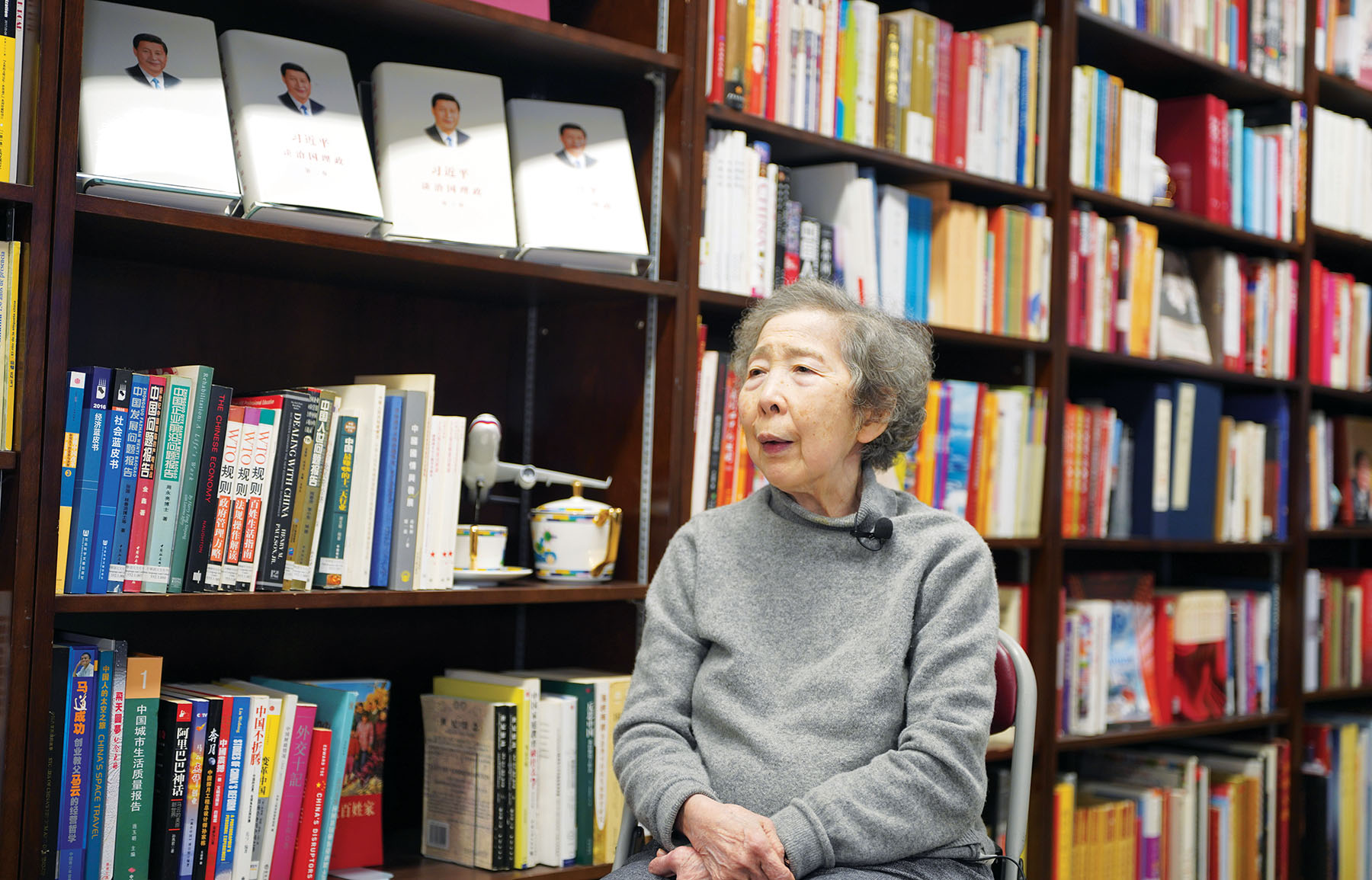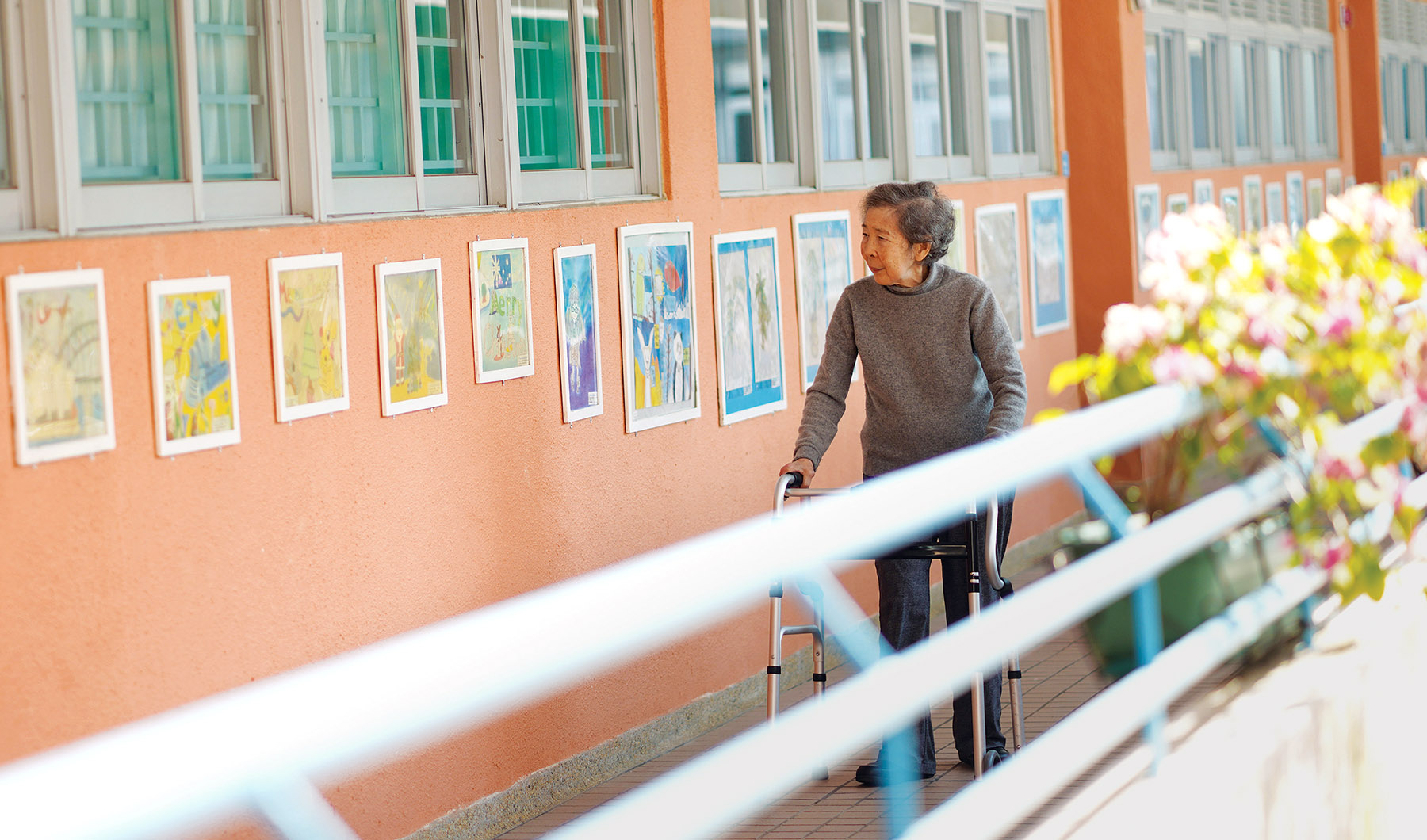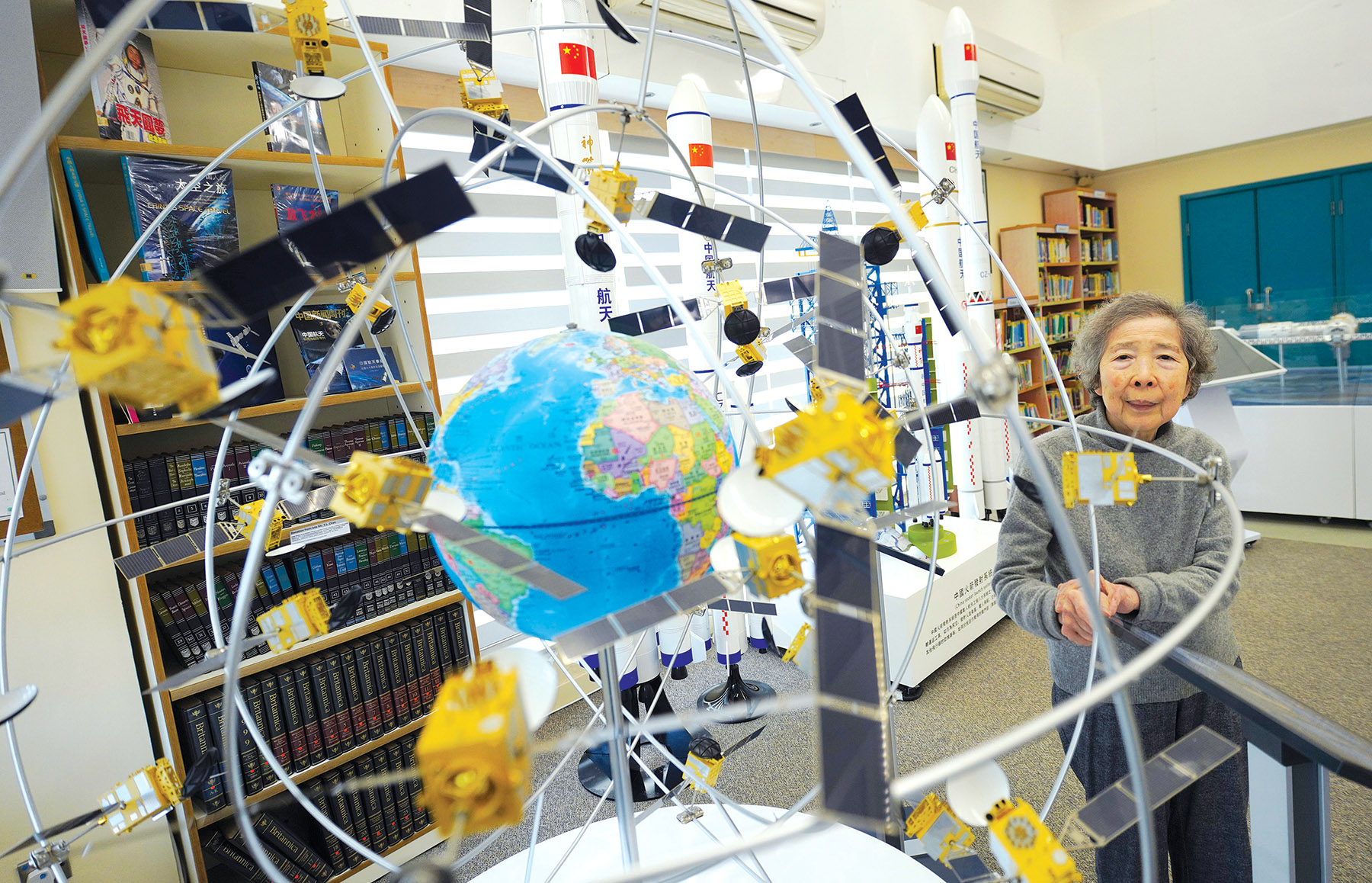Renowned Hong Kong entrepreneur Annie Wu Suk-ching has come to represent the Chinese identity and spirit, rising to the occasion as China embarked on a momentous drive for economic reform. She talks to Luo Weiteng.

The weight of a nation’s destiny rests upon every shoulder — the sheer sense of responsibility, resilience and unity has echoed through the ages as a defining pillar of Chinese history.
When China’s future was put to the test with its reform and opening-up in 1978, legendary Hong Kong businesswoman Annie Wu Suk-ching and her father James Tak Wu responded in an unassuming way — going the extra mile to help airlines operating out of Beijing to deliver hot, preferred meals for passengers.
Their story in a nationwide “just-do-it” push, coupled with the “serendipity or coincidence” of yesteryear, began with what Annie Wu calls a “natural, yet bold choice out of patriotism that’s pure and instinctive”.
The resoluteness to head north as China launched a historic push for economic advancement sprang from a fervent display of national identity that propelled them to perform deeds for the motherland.
READ MORE: Bridging East and West
“It’s quite simple. With a Chinese identity, you strive to do something for the welfare and the good of your own country,” Wu tells China Daily.
Such a national attachment and devotion has its roots in teachings from Wu’s ancestors that have been woven into her family’s moral fabric.
Wu, born and bred in Hong Kong, recalls the profound influence of her grandfather whom she portrays as a “patriot”. “He was born in the United States, yet deeply connected to his Chinese heritage. He felt so avidly as a Chinese, with a long-cherished desire to make a tangible contribution to his native soil.”

Pioneering ventures
As the bellwether of the first batch of Hong Kong-based businesspeople to invest on the Chinese mainland, Wu and her father were among few with the courage to embrace a daring, near iconoclastic spirit of change in the most populous nation on earth.
The reopening and normalization of Sino-US relations following then-US president Richard Nixon’s groundbreaking visit to China in 1972 had made scheduled commercial airline services between the two countries a necessity after a hiatus of over three decades.
As the historic move focused the spotlight on the food supply capability of mainland airlines, Wu’s father dealt with an issue that had posed an obstacle to restoring normal flights between the two countries. The following years saw the birth of Beijing Air Catering Co, then registered as “Sino-foreign Joint Venture 001”, reflecting the nation’s pioneering commitment to use its energy and resources for economic development, and open the door to investors outside the mainland through joint ventures.
The bold moves were greeted with skepticism and doubt at the outset. “You can’t even speak Putonghua and don’t have any guanxi (the practice of drawing on connections to secure favors in personal relations, particularly in Chinese business culture). How can you expect to make it?”
Even Wu’s uncle, Wu Shun-tak, who had built up a business empire from scratch with her father, was apprehensive about a lack of protection for entrepreneurs on the mainland. His advice to the issue was: Why take the risk?
Despite the obstacles in their way, Wu and her father had the courage of their convictions. “We weren’t representing any company, but ourselves,” she reminisces. The stage was set for a wearisome, hourslong train-and-plane pilgrimage to Beijing for protracted talks with the Civil Aviation Administration of China in mid-1979. At the time, the Chinese government had no experience dealing with overseas investors. Officials had no clue what was legal or wasn’t, with only 14 statements about how to encourage investments on the mainland, so Wu had to translate the contract, letter of intent and relevant clauses of corporate law commonly used in Hong Kong into Chinese for their perusal.
The talks moved at a snail’s pace, with both sides devoid of leads. “We had to rely on facial expressions, gestures and traditional Chinese characters written on paper to communicate with officials at Beijing Hotel,” recalls Wu.
Multiple trips between Hong Kong and Beijing were an eye-opener for Wu, who used the word “alien” in a previous interview with China Daily to describe the “culture shock” she encountered, and the starkly different business climate she had to adapt to. “Yet, this is worthwhile. If we can contribute to our motherland in the way Hong Kong does, we should strive to do the utmost.”
As the deadline set by the late architect of economic reform, Deng Xiaoping, for both sides to agree to a deal by May 1, 1980, approached, then-CAAC chief Shen Tu anxiously asked Wu’s father if he could start preparatory work before getting the final green light.
Out of a firm belief in the nation’s foresight and determination to open up to the outside world, Wu’s father decided to take the plunge in less than 30 seconds of deliberations. He raised HK$5 million in Hong Kong (about $1 million at the time) — a princely sum then — to purchase equipment overseas and transport it through Hong Kong to Beijing.
“Without any contract or letter of authorization in black and white, a handshake with Shen simply meant the deal was nailed down,” says Wu.
Achieving the impossible
By March 1980, all the equipment had been installed and set for a trial operation. But an official nod remained outstanding. Wu vividly remembers the long, stressful wait that could hardly be confided in anyone else, the courage to get the trailblazing project off the ground with nothing approved, and the strong faith in achieving what she calls “an impossible feat”.
The wheels of change were finally set in motion, and all the paperwork was in place by April 1980, heralding China’s much-awaited first joint venture.
What began as two rivers — personal will and public good — now moved as one current. “Both sides treated each other heart-to-heart and shared the weal and woe of the mother country. Our shared ancestral and cultural roots had fostered mutual trust, sincerity and patience in the monthslong negotiations,” says Wu.
The tale and anecdotes behind the founding of Beijing Air Catering added compelling footnotes to what the World Bank hails as the “fastest sustained expansion by a major economy in human history”.

A global vision
In the past four decades, Wu has been an ardent supporter, keen contributor and active participant in endeavors and undertakings that make China loom large on the world stage. Such a zestful role bears a striking resemblance to that of her hometown, Hong Kong — the “superconnector” and “super value-adder” — with the best of both worlds.
Today, Hong Kong is in the throes of a major transformation, looking to redefine its role and rewrite its development path.
“After eventful and momentous years, Hong Kong’s making a comeback. We have a new Hong Kong to embrace and an old Hong Kong to go beyond,” says Wu, who serves as a lifetime honorary board member of the World Trade Centers Association.
She says she believes this demands an outward-looking strategy and concrete efforts with a greater external focus to genuinely make Hong Kong a “high-level world city” and a magnet for the finest minds from all over the world.
There’s a pressing need to think outside the box, she says, and carve out a new route in pursuing more business opportunities for Hong Kong, giving foreign professionals and establishments that had retreated during the COVID-19 pandemic a compelling reason to return and call the city their home.
It’s also imperative to be the earnest promoter of what sets Hong Kong apart as a go-to business destination with lasting stability and prosperity, and “explain properly the benefits of the implementation of the National Security Law for Hong Kong for overseas businesses”.
“We can’t expect to sit at home waiting as in the good old days. We should look outward and be much more proactive overseas,” says Wu.
In her view, promoting the city’s National Security Law among local residents “isn’t too effective”. Such underperformance could be blamed on an appalling lack of national education since the handover.
April 15 marks the 10th National Security Education Day. The NSL for Hong Kong was unanimously passed by the Standing Committee of the National People’s Congress — the nation’s top legislature — on June 30, 2020, and promulgated in time to mark the 23rd anniversary of the city’s return to the motherland.
At 76, Wu represents a fading generation that has gone through British rule and reunification with the motherland. Younger generations, growing up under the post-handover education system that emphasizes subjects like English, Chinese and mathematics, with scant attention being paid to Chinese history, perceive the concept of a nation in a different light.
She recalls that during her school days in Hong Kong, Chinese history used to be a compulsory subject at senior secondary level. But, since 1997, Chinese history has been pushed into the back seat and incorporated into liberal studies.
Bereft of a “proper way of educating young people to respect our country and being the citizens of the Hong Kong Special Administrative Region”, it could easily sow confusion and misunderstanding about what national security really means for the city.
Wu says there should be more top-down efforts and holistic planning, with the SAR government given its due role in putting national education at the top of the agenda.
Nurturing future generations
Fully devoted to the education cause, Wu founded the Chinese Foundation Secondary School in 2000 as a “platform and base” to act on her educational ideas.
Modern China, rich in tales of economic transformation, technological advancement and cultural shifts, has emerged as a nuanced tapestry of epic narratives. To better acquaint students with where the nation came from and what it has achieved so far, Wu has made big efforts to purchase and demonstrate a constellation of books, models and facilities that offer a lively glimpse of the motherland. These include space suits, models of the return capsules, the Mars rover and Long March rockets that represent revolutionary breakthroughs and giant leaps in the nation’s grand journey of space exploration.
ALSO READ: Wu: EC members to help boost trade, investment
The Chinese Foundation Secondary School stands as “the one and only in Hong Kong” with a well-crafted documentary about how Hong Kong has its story intertwined with magnificent episodes of time-honored Chinese history, reflecting Wu’s unwavering aspiration to nurture cultural confidence, historical consciousness and a national identity that provide a sense of continuity and belonging among Hong Kong’s young people.
At 70, I could do what I would without going beyond what’s right, the great Chinese philosopher Confucius once said.
Here, the identities of being an entrepreneur, an educator and a Chinese national find self-consistency in Wu under an all-consuming sense of patriotic duty from the bottom of her heart.
BORN:
September 1948 in Hong Kong
HONORS:
1978: Hong Kong Ten Outstanding Young Persons Award
1987: Hong Kong Award for Excellence in Business
1990: Young Industrialist Awards of Hong Kong
1997: Justice of the Peace
1999: Silver Bauhinia Star
2020: China’s Inspiring Role Model at the Annual “Touching China” Awards 2019
CAREER:
1984: First Asian Woman Member of the board, World Trade Centers Association, New York
1988-2009: Chairwoman of the executive committee, Chinese History and Culture Educational Foundation for Youth
1988-2003: Member of the National Committee of the Chinese People’s Political Consultative Conference
2000: Founder of the Chinese Foundation Secondary School, Hong Kong SAR
2003-2018: Member of the Standing Committee of the Chinese People’s Political Consultative Conference National Committee
Contact the writer at sophialuo@chinadailyhk.com


